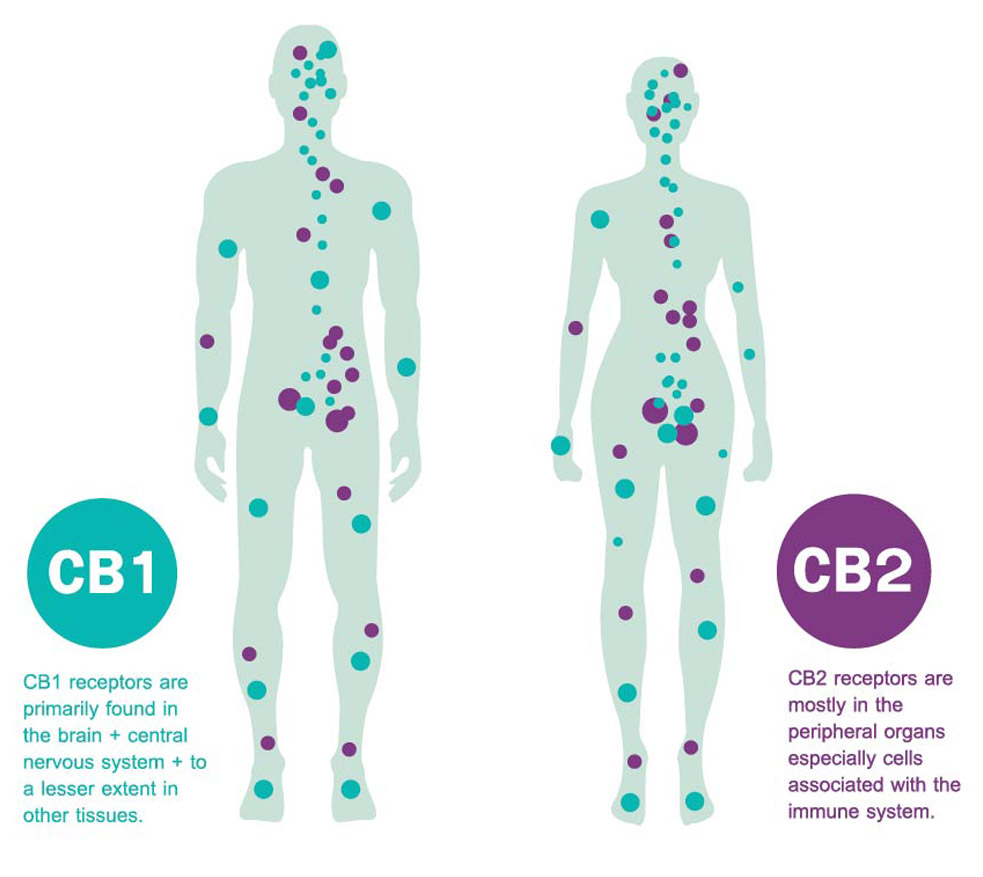Cannabidiol (CBD) is a natural medicine extracted from the cannabis plant, used to potentially treat or alleviate symptoms of many illnesses. As one of 100+ chemical compounds found in the cannabis plant (known as cannabinoids), CBD is well-known for its potential therapeutic effects.
Unlike Tetrahydrocannabinol (THC), which is the main psychoactive compound found in the cannabis plant, CBD is completely non-psychoactive (meaning it doesn’t get you ’high’). To create CBD oil, the Cannabidiol is extracted from the cannabis sativa plant before being diluted with a carrier oil (such as coconut or hemp seed oil).
How does CBD work? Endo-Cannabinoid System (ECS)

The human body contains a biological system called the Endocannabinoid system (ECS), which plays a key role in regulating several functions of the body including appetite, pain, immune system response and sleep. Often referred to as our body’s ‘universal regulator’, the Endocannabinoid system (ESC) is comprised of Endocannabinoids, which are neurotransmitters that bind to cannabinoid receptors in your nervous system. Research has shown that CBD can potentially reduce chronic pain by impacting endocannabinoid receptor activity, which reduces inflammation and interacts with neurotransmitters.
What are Cannabinoids?
Cannabinoids are chemical compounds which act on cannabinoid receptors. There are three types of cannabinoid compounds:
1. Endocannabinoids
- Neurotransmitters produced by human tissue
- anandamide (AEA) and 2-arachidonoylglyerol (2-AG)
2. Phytocannabinoids
- Naturally occurring cannabinoids found in plants
- CBD and THC are both phytocannabinoids
- 113 total cannabinoids have been identified in the hemp plant
3. Synthetic Cannabinoids
- Man-made, manufactured cannabinoids
How do I use CBD?
There are several different methods of consuming Cannabidiol (CBD), depending on each patient’s condition and individual preference. CBD can come in the form of oil, capsules, flower, crystal, lozenges, and spray, with the most commonly used product form being CBD oil. We recommend consulting with your Doctor to see whether CBD is a suitable therapy for you and if so, recommend the product form that will be best suited to your condition. Always follow the directions on the product label before consuming.
What are the side effects?
Using CBD oil with other medications may render those medications ineffective. CBD can also potentially interfere with an enzyme called ‘cytochrome P450 complex’. This disruption may affect the liver’s ability to break down toxins, which can increase the risk of liver toxicity. For more information regarding potential side effects please visit the TGA’s website here.
Disclaimer: This is not an inducement to use Medicinal Cannabis. Medical Cannabis doesn’t work for everyone, and it may not work for you. How Cannabis affects a person depends on many things, including their size, weight, age and health, dosage and tolerance, and the results can vary. Some people may experience side effects when taking Cannabinoid therapies. The information provided by Vivace Health is for educational and informational purposes only. For medical advice, please check with your doctor and request a referral. For more information on medicinal cannabis access in Australia, visit the TGA website.